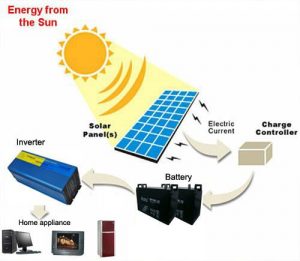
We’ve all heard of renewable energy sources. They’re supposed to be better for the environment, right? But what exactly is renewable energy? It’s a general term used to describe energy sources that are not depleted when used. In other words, they can renew or regenerate themselves. The two most common types of renewable energy are solar and wind power. Today, we’re going to focus on solar power and why is solar energy considered a renewable energy source. According to the Solar Energy Industries Association (SEIA), not only has Nevada ranked as the 6th best state in the nation to go solar for mpre inforamation view here.
When it comes to renewable energy sources, solar power is one of the most commonly talked about. Solar energy is considered a renewable resource because it is constantly replenished by the sun. The sun shines every day, making solar power a never-ending source of energy.
Contents
How Solar Power Works?
Solar power is a technology that converts sunlight into electricity. Solar panels, also called photovoltaics (PV), are made up of many small solar cells. When sunlight hits a solar cell, electrons are knocked loose from their atoms. These freed electrons flow through the material to create an electric current. This current can then be used to power electrical devices or to be stored in batteries for later use.
The Benefits of Solar Power
Solar power has many benefits over traditional fossil fuels. First, it’s environmentally friendly. Unlike fossil fuels, solar power doesn’t release greenhouse gases into the atmosphere. Greenhouse gases like carbon dioxide trap heat in the atmosphere and cause global warming. Second, solar power is a renewable resource. This means that as long as there is sun, we can generate electricity from it. Third, solar power is versatile. It can be used to power homes, businesses, and even vehicles! And fourth, solar power is becoming more affordable as technology improves. The cost of installing solar panels has fallen by 94% since 2010!

Why Solar Power Is Considered Renewable Energy?
Now that we know how solar power works and some of its advantages, let’s talk about why it’s considered renewable energy. As we mentioned before, one key requirement for an energy source to be considered renewable is that it must be able to regenerate or renew itself. Solar power meets this criteria because as long as there is sun—and there will be for at least the next few billion years—we can generate electricity from it!
Another reason why solar power is considered renewable is that it has a very low environmental impact compared to other forms of energy generation such as coal or natural gas. Solar panels don’t produce any air pollution or water pollution, and the only solid waste they generate is recycled glass, metal, and plastics from the manufacturing process.
Conclusion
In conclusion, solar energy is considered a renewable resource because it can regenerate itself and has a very low environmental impact. With the falling cost of installation and advances in technology, solar power is becoming an increasingly popular choice for those looking for an alternative to traditional fossil fuels.



